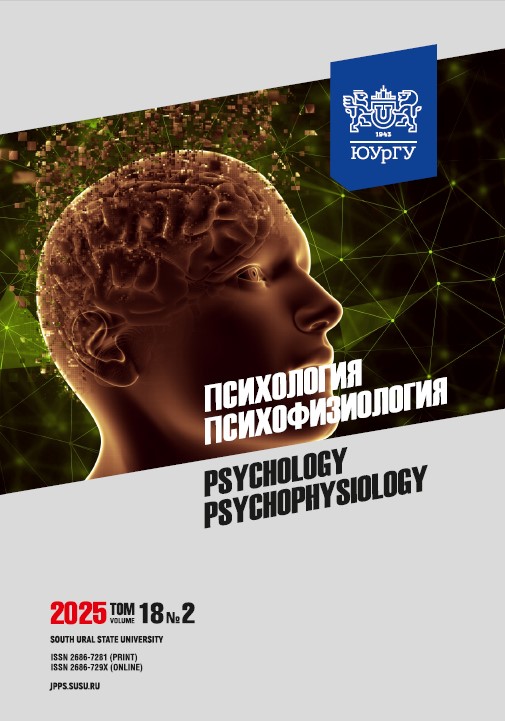The role of situational context in shaping students’ mental states in academic settings
Abstract
Introduction. Mental states are shaped by situational determinants, conceptualized within a triangle model combining external environmental factors, mental state, and internal personal factors. The role of the situation itself within the structure of mental phenomena remains underexplored. This study examines the impact of situational factors on students’ mental states across different educational activities. The aim of this study is to identify the importance of situational factors in the development and manifestation of mental state. Materials and methods. This study was conducted across different academic settings (lectures, seminars, and exams). The sample comprised 110 students (94 female, 16 male; mean age 20 years) from Kazan Federal University. In order to assess the influence of internal and external factors on a person's mental state, “Factors of human mental states” (A.O. Prokhorov, A.V. Makarcheva); the method of “Semantic differential” was used for subjective attitude to the situation. (Ch. Osgood); intensity of manifestation of substructures of mental states –“Relief of the mental state of a person” (A.O. Prokhorov). The evaluation of the interrelationships of the indicators was obtained as a result of Pearson's correlation analysis. The statistical analyses included descriptive statistics and Pearson correlation analysis performed in SPSS Statistics 22.0. Results. This study demonstrated that mental activity levels varied across different academic settings: low during lectures, moderate (optimal) during seminars, and high during exams. Key influencing factors also differed: in lectures, mental state changes were primarily driven by “Significant circumstances” and “Action and behavior”, whereas seminars and exams were influenced by “Intellectual characteristics” and “Action and behavior”. Conclusion. These findings are of practical importance for designing student training programs and regulation and self-regulation strategies with respect to context-dependent factors that shape mental states in academic settings
Downloads
References
2. Aleksandrova O.V. Dermanova I.B. Psychosemantic approach to assessing a difficult life situation (using the example of a situation related to a childs life-threatening illness). Vestnik of Saint Petersburg University. Psychology = Vestnik SPbGU. Psihologiya. Pedagogika. 2016;16(4):40–50. (in Russ.). DOI: 10.21638/11701/spbu16.2016.403.
3. Solntseva G.N. Situational approach: types of situations and psychological characteristics. Psihologiya. Zhurnal Vysshej shkoly ekonomiki = Psychology. Journal of the Higher School of Economics. 2021;18(3):525–543. (in Russ.). DOI: 10.17323/1813-8918-2021-3-525-543.
4. Prokhorov A.O. Structural and functional model of mental regulation of mental states of the subject. Psihologicheskii zhurnal = Psychological Journal. 2020;41(1):5–18. (in Russ.). DOI: 10.31857/S020595920007852-3.
5. Prokhorov A.O., Kartasheva M.I. The I-system in the subjective (mental) experience of experiencing non-equilibrium mental states. Eksperimentalnaya psikhologiya = Experimental Psychology. 2020;13(3):89–104. (in Russ.). DOI: 10.17759/exppsy.2020130307
6. Prokhorov A.O. Situational aspects of mental regulation of mental states. Teoreticheskaya i eksperimentalnaya psikhologiya = Theoretical and Experimental Psychology. 2023;4(16):13–27. (in Russ.). DOI: 10.11621/TEP-23-26.
7. Prokhorov A.O., Chernov A.V., Kartasheva M.I. The influence of mental structures on the effectiveness of self-regulation of mental states in students educational activities. Sibirskiy psikhologicheskiy zhurnal = Siberian journal of psychology. 2022;(86):66–83. (in Russ.). DOI: 10.17223/17267080/86/4.
8. Grishina N.V. Targeted regulation of human behavior. Vestnik Sankt-Peterburgskogo universiteta. Psikhologiya = Vestnik of Saint Petersburg University. Psychology. 2023;13(3):310–323. (in Russ.). DOI: 10.21638/spbu16.2023.302.
9. Thornton M.A., Tamir D.I. Neural representations of situations and mental states are composed of sums of representations of the actions they afford. Nature Communications. 2024;15(620):13. DOI: 10.1038/s41467-024-44870-7.
10. Thornton M., Lin Ch. Evidence for bidirectional causation between trait and mental state inferences. Journal of Experimental Social Psychology. 2023;108. DOI: 10.1016/j.jesp.2023.104495
11. Mironova O.I. Approaches to the study of examination stress in students. Pedagogika i psihologiya obrazovaniya = Pedagogy and Psychology of Education. 2021;1:159–170. (in Russ.). DOI: 10.31862/2500-297X-2021-1-159-170.
12. Gondo D., Bernardeau-Moreau D., Campillo P. Student Stress and the Effects of Relaxation: A Study Conducted at the University of Lille in Northern France. Social Sciences. 2023; 12(6). DOI:10.3390/socsci12060318.
13. Pascoe M.C., Hetrick S.E., Parker A.G. The impact of stress on students in secondary school and higher education. International Journal of Adolescence and Youth. 2020;25:104–112. DOI: 10.1080/02673843.2019.1596823.
14. Gonzalez-Suarez R., Vieites T., Pineiro I., Diaz-Freire F.M. Self-Regulation and Stu-dentsWell-Being: A Systematic Review 2010–2020. Sustainability. 2022;14(4):2346–2372. DOI: 10.3390/su14042346.
15. Surjeet Singh. Self-regulation as a correlate of psychological well-being. Indian Journal of Health and Well-being. 2022;9(3):441–444. 2022.
16. Makarcheva A.V. Changes in students mental states in educational situations characterized by different levels of tension. Psikhologiya. Istoriko-kriticheskie obzory i sovremennye issle-dovaniya = Psychology. Historical-critical Reviews and Current Researches. 2023;12(3-4A):22–33. (in Russ.). DOI: 10.34670/AR.2023.37.13.003.
17. Prokhorov A.O. Metodiki diagnostiki i izmereniya psihicheskih sostoyanij lichnosti [Methods of diagnosis and measurement of mental states of personality]. Moscow. PER SE. 2004:176. (in Russ.).
18. Prokhorov A.O., Chernov A.V., Yusupov M.G., Reshetnikova I.S. Development of self-regulation of mental states in students during their studies at a university. Novye psikhologicheskie issledovaniya = New Psychological Research. 2021;4:71–90. (in Russ.).
19. Bystrushkin S.K., Seliverstova I.G., Gribtsova L.S., Khlystova V.G., Shalenko A.N. The influence of socio-psychological attitudes on the mental state of students of secondary vocational education in the context of educational activities. Mezhdunarodnyi zhurnal prikladnykh i funda-mentalnykh issledovanii = International journal of applied and fundamental research. 2020;8:7–11. (in Russ.). DOI: 10.17513/mjpfi.13107.
20. Prokhorov A.O., Valiullina M.E., Yusupov M.G. Features of mental regulation of cognitive states of schoolchildren depending on the level of stressfulness of the situation. Theoretical and experimental psychology. Teoreticheskaya i eksperimentalnaya psikhologiya = Theoretical and Experimental Psychology. 2023; 17(2):144–157. (in Russ.). DOI: 10.11621/TEP-24-17
References on translit
-Copyright (c) 2025 Psychology. Psychophysiology

This work is licensed under a Creative Commons Attribution-NonCommercial-NoDerivatives 4.0 International License.



